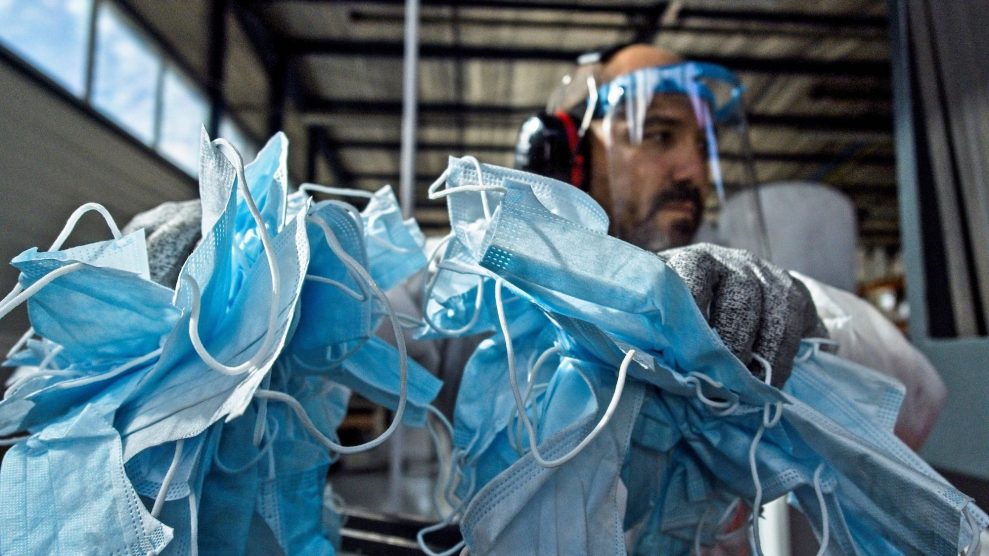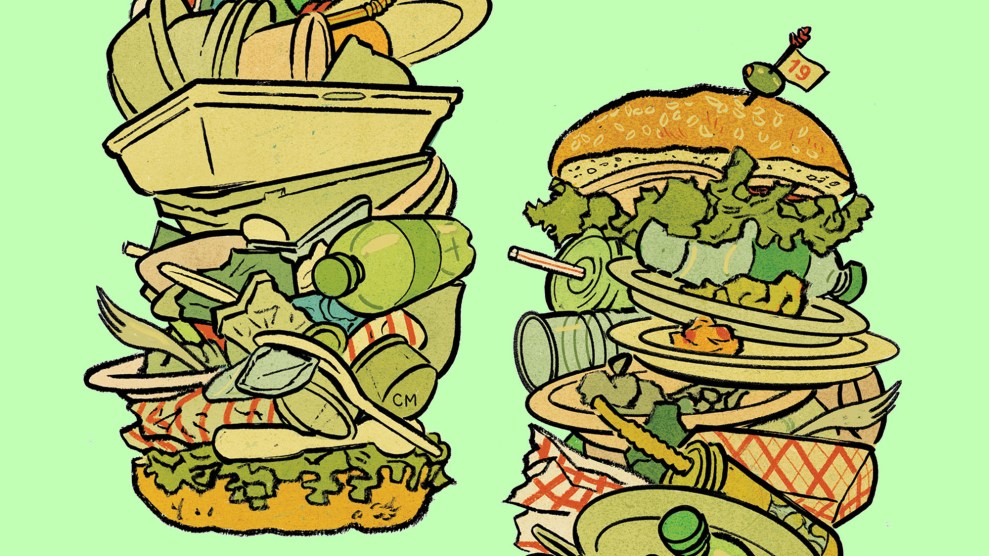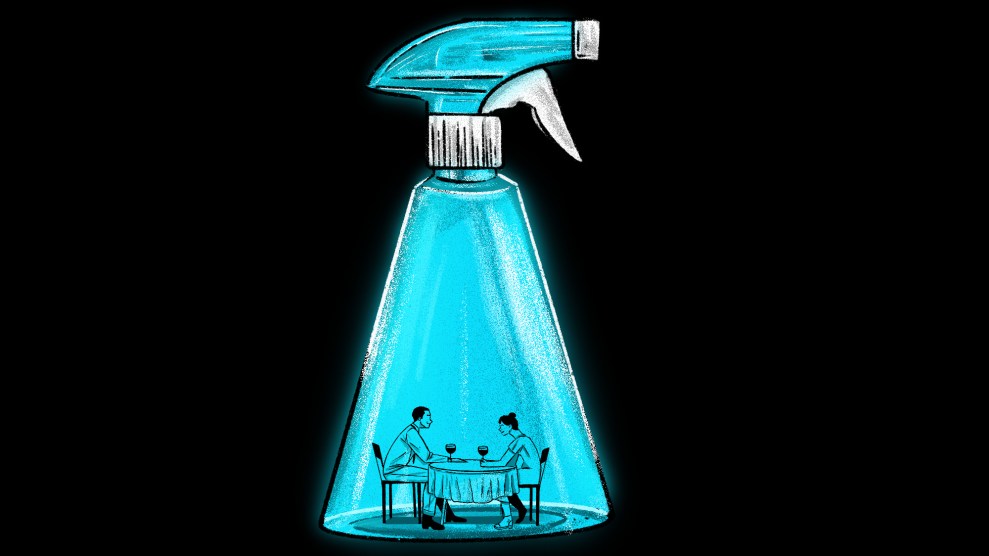
A worker at the start-up Plaxtil company handles protective masks as they are made ready for recycling.Guillaume Souvant/Getty
This piece was originally published in High Country News and appears here as part of our Climate Desk Partnership.
In March, Seattle was the epicenter of the COVID-19 pandemic, and the parents of Yooni Kim, a retail worker, were worried about her. They sent her a package of disposable masks, and she began wearing them to work. But that created a new problem for their environmentally conscious daughter: How could she responsibly dispose of the used masks? Soon, she discovered a potential solution: a recycling service, offered by a company called TerraCycle. For $86, TerraCycle would send Kim a small “ZeroWaste” box, roughly the size of a toaster oven, which she could fill with used masks and ship back to the company for recycling.
As Kim debated making the purchase, she wondered what happens to recycled masks, and about the environmental impacts of TerraCycle’s process. She figured it had to beat the alternative: millions of used masks piling up in landfills or being burned in incinerators, depending on the local waste company’s practices. “It is an expensive thing to invest in,” she said. “But I was open to paying for it, because if someone wants to dispose of masks responsibly, why not?” Determining what constitutes responsible disposal, however, is not straightforward. And, experts say, a truly sustainable solution would require rethinking manufacturing systems, long before any masks hit the trash or recycling bin.
TerraCycle was founded as a worm fertilizer company in 2001. Since then, it has pivoted to recycling items other companies won’t accept, such as pens and markers, plastic wrap and single-use coffee capsules. So far this year, it’s collected and processed 74,000 pounds of disposable masks, gowns and gloves, stationing ZeroWaste boxes at the Venetian Resort in Las Vegas and Subaru dealerships, as well as selling them to individual consumers like Kim.
To recycle the items, workers first sort through the large piles of used personal protective equipment sent to the TerraCycle headquarters in New Jersey to ensure that the dominant material is the non-woven polypropylene used in most disposable masks. (Metal nose strips from N95 masks, for instance, are removed.) Then, the piles are melted down and shredded into a mulch-like material that can be molded into things like railroad ties and shipping pallets. The resulting plastic is structurally sound, but looks uneven and dull, so selling it doesn’t net TerraCycle much money. That’s why the recycling boxes are expensive: The high price tag offsets what would otherwise be a net loss for the company.
The process may not be profitable, but according to TerraCycle, it can help the environment. “By recycling disposable masks, they are kept out of landfills and can be made into new materials and products, reducing the need to extract new materials from the planet,” said Shaye DiPasquale, TerraCycle’s publicist. DiPasquale also noted that bacteria from landfills produce methane, a greenhouse gas that contributes to global warming.
But according to Jonathan Krones, an industrial ecologist at Boston College, the environmental calculus is more complicated than that. Recycling masks doesn’t necessarily reduce demand for freshly made plastic. “Would plastic lumber or fleece have been made in the first place without the recycled plastic material? I’m not convinced,” he said. And while landfills do produce methane emissions, they’re mostly from decomposing food or paper, Krones said, not bacteria on plastics such as disposable masks. Furthermore, transporting and melting down masks during recycling requires significant energy, unlike simply letting them sit in a landfill.
Ultimately, it’s impossible to definitively determine whether it’s more environmentally friendly to throw away masks or recycle them through services like TerraCycle’s. If the goal is to reduce environmental impacts, we should be asking questions about mask manufacturing, not recycling, said Krones, because most of the environmental costs come from making masks in the first place. “There’s no good option, because the product is inherently garbage,” he said. In other countries, such as Japan and Germany, manufacturers are required to take back some used products and front a portion of the disposal costs. But no such federal rules currently exist in the US.
Still, even if recycling masks isn’t more environmentally beneficial than just tossing them, TerraCycle’s work helps remind consumers and companies that trash doesn’t disappear after it’s thrown out. Simply offering a service that requires consumers to mail in items by type illuminates the fact that not everything is easily recyclable, and that precious time and energy are required to properly sort recyclable pieces.
And, Krones said, TerraCycle’s service has the power to get more people interested in learning about recycling and disposal systems. Kim learned how difficult it can be to properly recycle everyday items, and she has since become more interested in ways to create systemic change. “We’re all doing the best we can, and ultimately, the biggest changes will have to come from corporations reducing waste,” she said. As for purchasing a TerraCycle box, she’s trying to mobilize her neighbors to buy one together, so the high cost will be shared. “If I can find people who want to split a $90 box, then I’m sure we can pack it really tight,” she said.












